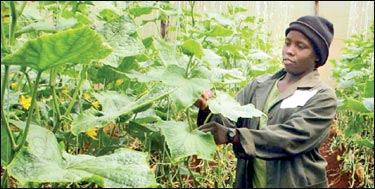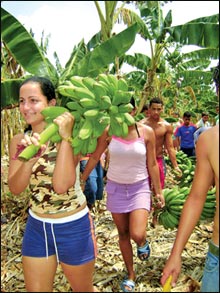Trade and the Millennium Development Goals
Nike worker in Asia - Corporate Watch
Free trade economists argue that lower barriers to global trade
result in higher trade volumes, prosperous national economies and
poverty reduction. An alternative perspective observes that, in the
recent era of economic deregulation, trade has become the vector which
infects the world with the characteristics of laissez-faire capitalism.
Having no goal other than to replicate itself, trade lurches between
boom and bust, widening divisions between rich and poor countries.
Since 1995, when the current trade regime came into force, global
import duties ("tariffs") and other protectionist measures have fallen
to all-time lows and world trade has indeed grown handsomely at almost
10% pa. However, Africa's share of world merchandise exports has
steadily fallen to just 3% in 2006, inconsistent with a region
supporting over 10% of the world's population. Whilst China has been the
dynamo of trade liberalisation since admission to the World Trade
Organisation (WTO) in 2001, its booming economy has created only 13
million new jobs, small comfort for the 300 million underemployed in the
countryside. In India too, the status of economic tiger has resonance
only for the urban elites.
|

African leaders want the West to eliminate trade-distorting
practices in the agricultural sector. (Source: Internet) |
With similar patterns elsewhere is Asia, hundreds of millions of
rural people, more than the entire population of Africa, are fighting a
decline in food resources. With about 80% of Africans also dependent on
farm livelihoods, the number of people in the world classified as hungry
is rising, a statistic that indicts the world trade bonanza for
selectivity in its wealth creation and failure in agriculture.
In both continents this rural exclusion is also forcing radical
change in the traditional role of women in subsistence farming. In Asia
poor women from rural regions are migrating to the ubiquitous Export
Processing Zones (EPZs) where they dominate the production lines,
especially in electronics and light consumer goods. Working conditions
are vulnerable and largely without protection from the trade regulations
that stimulate the EPZs.
Poverty, hunger and gender issues underpin the Millennium Development
Goals (MDGs) and Goal 8 (Develop a Global Partnership) calls upon
countries to create a trading system which "includes a commitment to
good governance, development and poverty reduction". There is a
contradiction between the obligations of the Millennium Declaration and
WTO membership which the richer countries, as signatories to both, have
chosen to overlook.
Trade and Climate Change
A recognised characteristic of a low barrier trade regime is
migration of the world's manufacturing industry to a single country
offering low wages and modest environmental regulations. This role is
currently filled by China where low-skilled workers earn less than 5% of
their US counterparts. The relevance to global warming of this
displacement of production is two-fold; firstly the factory process is
likely to be less energy efficient and secondly the goods require
transportation over a much greater distance. Neither of these carbon
footprints is costed within the trading system whose avarice for low
wages ignores the impact on global warming.
Climate change will have its most immediate and severe impact on the
poorest countries. Through its contribution to global warming, world
trade therefore has an indirect as well as a direct impact on global
poverty. Dr Rajendra Pachauri, Chairman of the Intergovernmental Panel
on Climate Change, has expressed the view that a successor to the Kyoto
Protocol should take into account emissions from shipping.
The Roots of Trade Injustice
The roots of the injustice that plagues world trade in agriculture
lie in the aftermath of the Second World War. Self-sufficiency in food
production and the survival of traditional rural communities were high
on the agenda of European governments. Formation of the European
Economic Community (EEC), the predecessor of the European Union (EU),
led to the Common Agricultural Policy which since 1962 has offered
subsidies to farmers and guaranteed prices against the risk of volatile
markets.
Motives underlying the US Farm Bill, first introduced in 1949, were
identical and the methods very similar. To a greater degree than Europe
the profile of small family farms merged over the decades into large
units attracting the bulk of the subsidies. The associated business of
input chemicals, food processing and distribution also became
concentrated into very large corporations such as Cargill and Monsanto
which have been labelled as "agribusiness".
Although agriculture was included in world trading rules from 1995,
these farm support programmes in the EU and US survived the negotiations
of the "Uruguay Round" (1986-1994), a period in which developing
countries were poorly equipped to punch their weight. By 2006 the OECD
estimated that annual farm subsidies in developed countries totalled
$362 billion, more than half the GDP of Sub-Saharan Africa. Advocates of
the "liberalisation" of African agriculture should consult cotton
growers in Mali, sugar producers in Uganda or chicken farmers in Ghana -
whose livelihoods have been cut away by cheap produce available from
rich countries. These gargantuan subsidies in US and EU protect less
than 5% of the workforce whilst blocking development in the world's
poorest countries where 68% of livelihoods are derived from agriculture.
|

Cuban youth lend a hand in agriculture. (Source: Internet) |
In parallel to the stubborn inertia of these farm support programmes,
the era of deregulation of world markets and capital flows has enabled
agribusiness to extend its grip to the extent of owning about a third of
the world's productive land and controlling 75% of global farm trade.
Such industry concentration makes for inefficient markets and
inappropriate influence over policy areas such as trade regulations.
Trade and Poverty Reduction
The prime concerns today of most of the poorer developing countries -
food security and the protection of rural communities - are precisely
those that gave rise to the unfair competition they now face. Trade
rules need to replace the vision of more trade for its own sake with a
vision of countries whose people can first secure their basic needs of
food, health services and education. Such needs are enshrined in
international human rights law as well as the MDGs. The UN special
rapporteur on the right to food, Olivier De Schutter, has said that "the
subsidies in the developed countries are ruining the developing
countries' producers."
This is not to deny that radical reform in Africa is essential.
Investment is required not only in agriculture itself but also in the
infrastructure of transport and administration demanded by export
markets. Small-scale farmers and fisherfolk need help to compete with
multinational agri-business, for example in the formation of
cooperatives. "Aid for trade" could support these objectives alongside
international trade rules framed from a genuine development perspective.
Enlightened trade regulations might also have calmed the reaction to
the surge in food prices that occurred during 2008. Instead, most of the
countries struggling with food security have intensified a drive towards
self-sufficiency in food, backed where necessary with barriers to trade
in either direction. Such strategies run counter to the argument that,
facing the uncertain impact of climate change on water availability and
crop yields, global food production should be optimised through locating
crops in their most suitable growing environment, regardless of national
boundaries. Trade could make a vital contribution to food security if
only a more sensitive regime could be created.
Trade Rules
Unfortunately the world trading system has become so complex that it
is difficult to identify either the rules in force for a particular
country or those on offer under constant rounds of negotiations. And the
rules themselves frequently fail to achieve their intent. Moreover, if a
free trade philosophy is to work for poor countries then it must first
work for agriculture. The removal of EU and US farm subsidies is the
cornerstone for this ambition; all other intricacies of the rules are
minutiae by comparison.
Most of the world's poorest countries are now members of the WTO, but
they are also increasingly party to regional and bilateral trade
agreements which are allowed to override WTO rules. Additionally there
are preferential agreements designed to help poor countries, both inside
and outside the WTO structure, some of which are restricted to countries
classified by the UN as LDCs (Least Developed Countries). These various
concessions enable about 80% of LDC exports to enter developed countries
duty free. However, this percentage has barely changed since 1996 and
strategically critical duties tend to remain firmly in place.
There are also 79 African, Caribbean and Pacific (ACP) countries
which, as former colonies, have historic concessionary trading terms
with the EU. These ACP terms were ruled as discriminatory by the WTO in
2002 and the EU has offered replacement agreements known as Economic
Partnership Agreements (EPAs). Development agencies such as Oxfam have
argued vigorously that these EPAs will damage the development interests
of the ACP countries. As a result, negotiations have overrun the
original WTO deadline of 2007.
Out of this muddle one fundamental is clear - that the US and EU are
in no mood to concede ground on the core issue of farm subsidies.
Instead of offering unconditional phased removal of this structural
fault line, they are prepared to offer subsidy reductions only as
bargaining chips. They aim to leverage greater access to emerging
markets in developing countries, not just in manufacturing but also to
internal services such as utilities, health and education.
Apart from raising questions about the democratic right of poorer
countries to control their own industrial strategy (in line with the
established model of history), this bargaining approach threatens to
rebound on agriculture. Poor countries are allowed to nominate crops
regarded as crucial for internal food security and protect them with
tariffs against external competition and price volatility.
These "special products" and "special safeguard mechanisms" are
traded off in negotiations, creating especial difficulty for countries
such as India whose geographic territory embraces a wide variety of
critical food produce.
The Politics of Trade and Poverty
The political prospects of clearing this impasse in the interests of
the LDCs are not good. The richer countries are now focused more
intently on gaining access to markets in the successful developing
countries such as Brazil and Malaysia - who in turn seek access to
northern markets in agriculture.
These new middle income countries have been able to organise
themselves more effectively in WTO negotiations, the G20 group headed by
Brazil being the most important.
An LDC Group has also formed but tends to be excluded as talks reach
critical stages or deadlines, one of the reasons why the WTO is accused
of being undemocratic. Whereas in the past the G20 were natural allies
of the poorest countries, there is anxiety now that their export
strength is becoming as much a threat to LDC domestic markets as the
traditional colonial relationships.
Fair Trade
Mocking the dysfunctional Doha negotiations, Fair Trade is booming
amongst the consumers of 20 countries of northern Europe and North
America.
Products endorsed with the Fair Trade label guarantee that the grower
has been paid a price influenced by the cost of production rather than
volatile commodity markets; furthermore that farm workers are protected
by appropriate labour standards and that a premium has been paid to
contribute to community projects.
In 2006 Fair Trade reached about 7 million farmers and their families
in poor countries.
Fair Trade is constrained by its application to export products such
as coffee and bananas. It faces a range of criticisms, for example that
it is a selective subsidy for which the poorest farmers are unlikely to
qualify. And climate change issues have not yet been absorbed into the
Fair Trade model.
However such views miss the point that the buyer has started out with
a vision of dignity and rights for the seller. Fair Trade creates an
inspiring linkage between everyday consumers in wealthy countries,
global trade and the challenge of world poverty. |



